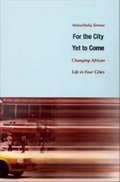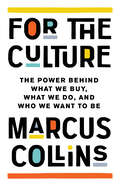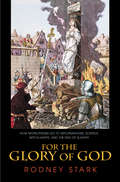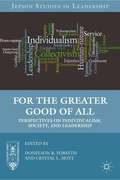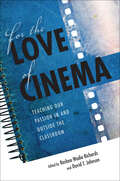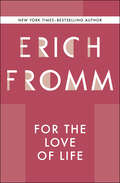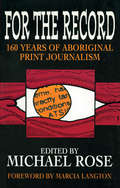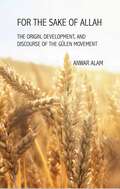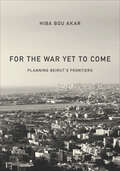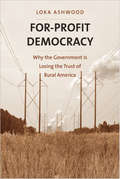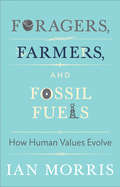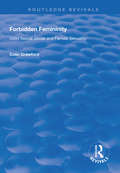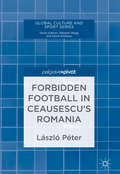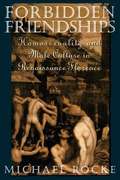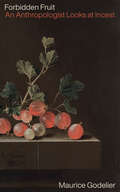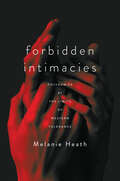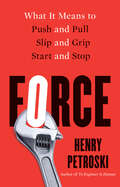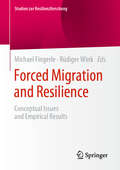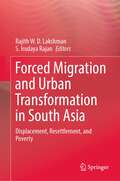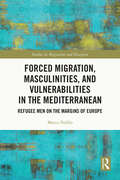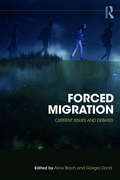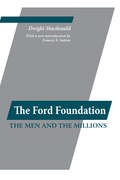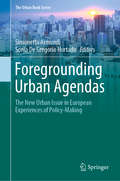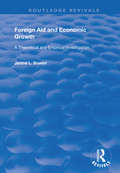- Table View
- List View
For the City Yet to Come: Changing African Life in Four Cities
by Abdoumaliq SimoneAmong government officials, urban planners, and development workers, Africa's burgeoning metropolises are frequently understood as failed cities, unable to provide even basic services. Whatever resourcefulness does exist is regarded as only temporary compensation for fundamental failure. In For the City Yet to Come, AbdouMaliq Simone argues that by overlooking all that does work in Africa's cities, this perspective forecloses opportunities to capitalize on existing informal economies and structures in development efforts within Africa and to apply lessons drawn from them to rapidly growing urban areas around the world. Simone contends that Africa's cities do work on some level and to the extent that they do, they function largely through fluid, makeshift collective actions running parallel to proliferating decentralized local authorities, small-scale enterprises, and community associations. Drawing on his nearly fifteen years of work in African cities--as an activist, teacher, development worker, researcher, and advisor to ngos and local governments--Simone provides a series of case studies illuminating the provisional networks through which most of Africa's urban dwellers procure basic goods and services. He examines informal economies and social networks in Pikine, a large suburb of Dakar, Senegal; in Winterveld, a neighborhood on the edge of Pretoria, South Africa; in Douala, Cameroon; and among Africans seeking work in Jeddah, Saudi Arabia. He contextualizes these particular cases through an analysis of the broad social, economic, and historical conditions that created present-day urban Africa. For the City Yet to Come is a powerful argument that any serious attempt to reinvent African urban centers must acknowledge the particular history of these cities and incorporate the local knowledge reflected in already existing informal urban economic and social systems.
For the Culture: The Power Behind What We Buy, What We Do, and Who We Want to Be
by Marcus CollinsUSA Today BestsellerThe architect of some of the most famous ad campaigns of the last decade marshals his expertise and &“elegantly friendly writing style&” (The Wall Street Journal) to reveal how our perspective is influenced by culture In For the Culture, Marcus Collins argues that true cultural engagement is the most powerful vehicle for influencing behavior. If you want to get people to move, you must first understand the underlying cultural forces that make them tick. Collins uses stories from his own work as an award-winning marketer—from spearheading digital strategy for Beyoncé, to working on Apple and Nike collaborations, to the successful launch of the Brooklyn Nets NBA team—to break down the ways in which culture influences behavior and how readers can do the same. With a deep perspective built on a century&’s worth of data, For the Culture gives readers the tools they need to inspire collective change by leveraging the cheat codes used by some of the biggest brands in the world.
For the Glory of God
by Rodney StarkRodney Stark's provocative new book argues that, whether we like it or not, people acting for the glory of God have formed our modern culture. Continuing his project of identifying the widespread consequences of monotheism, Stark shows that the Christian conception of God resulted--almost inevitably and for the same reasons--in the Protestant Reformation, the rise of modern science, the European witch-hunts, and the Western abolition of slavery. In the process, he explains why Christian and Islamic images of God yielded such different cultural results, leading Christians but not Muslims to foster science, burn "witches," and denounce slavery. With his usual clarity and skepticism toward the received wisdom, Stark finds the origins of these disparate phenomena within monotheistic religious organizations. Endemic in such organizations are pressures to maintain religious intensity, which lead to intense conflicts and schisms that have far-reaching social results. Along the way, Stark debunks many commonly accepted ideas. He interprets the sixteenth-century flowering of science not as a sudden revolution that burst religious barriers, but as the normal, gradual, and direct outgrowth of medieval theology. He also shows that the very ideas about God that sustained the rise of science led also to intense witch-hunting by otherwise clear-headed Europeans, including some celebrated scientists. This conception of God likewise yielded the Christian denunciation of slavery as an abomination--and some of the fiercest witch-hunters were devoted participants in successful abolitionist movements on both sides of the Atlantic. For the Glory of God is an engrossing narrative that accounts for the very different histories of the Christian and Muslim worlds. It fundamentally changes our understanding of religion's role in history and the forces behind much of what we point to as secular progress.
For the Greater Good of All
by Donelson R. Forsyth Crystal L. HoytThis volume draws on disciplines as different as Psychology, Anthropology, History and Biology to explain when and why individuals act to promote their own self-interest and when they sacrifice their own outcomes so that others can benefit.
For the Love of Cinema: Teaching Our Passion In and Outside the Classroom
by Rashna Wadia Richards David T. JohnsonWhat role does love—of cinema, of cinema studies, of teaching and learning—play in teaching film? For the Love of Cinema brings together a wide range of film scholars to explore the relationship between cinephilia and pedagogy. All of them ask whether cine-love can inform the serious study of cinema. Chapter by chapter, writers approach this question from various perspectives: some draw on aspects of students' love of cinema as a starting point for rethinking familiar films or generating new kinds of analyses about the medium itself; others reflect on how their own cinephilia informs the way they teach cinema; and still others offer new ways of writing (both verbally and audiovisually) with a love of cinema in the age of new media. Together, they form a collection that is as much a guide for teaching cinephilia as it is an energetic dialogue about the ways that cinephilia and pedagogy enliven and rejuvenate one another.
For the Love of Language
by Kate Burridge Tonya N. StebbinsLanguage is essential to human life, both as a basic social necessity and also as a powerful and complex social resource. For the Love of Language: An Introduction to Linguistics offers a comprehensive introduction to the workings of language and the role of linguistics in investigating its fundamental design. This thorough and engaging investigation into language and linguistics covers topics including: - strategies for learning about how language works - using linguistics to address real-world problems - the structure and meaning of words - the systems that organise language - changes to language over time - how language is used in written and spoken communication - the links between language, the mind and the world. Written by authors with extensive academic experience in the field of linguistics and including examples from Australia, New Zealand and around the world to engage the reader, For the Love of Language is a lively yet comprehensive resource for undergraduate students in foundation linguistics.
For the Love of Life
by Erich FrommThis poignant philosophy about the human capacity for love in the face of tragedy from the New York Times–bestselling author is as relevant today as it was when it was first broadcast. Transcribed from a series of recorded conversations streamed over German public radio in 1970, the profound ideas and thoughts collected in this volume represent a lifetime of the renowned psychoanalyst and social philosopher&’s explorations into human emotion and behavior throughout the twentieth century. Insightful and provocative, Erich Fromm meditates on the preoccupations that drive human action or inaction, interweaving related ideas from such profound thinkers as Sigmund Freud, Albert Camus, and Karl Marx. Here, Fromm recognizes the links between rising contemptuous boredom and overwhelming overabundance. He unravels the confusing mysteries of religious doctrines by examining the causes and motives behind our aggressive tendencies and revealing how dreams connect us all as a universal language. Fromm&’s perspective offers a vivid portrait of our ever-evolving social history and the difficulty of experiencing personal growth in a world driven by &“manufactured needs.&” Despite all of modern life&’s trials, For the Love of Life celebrates Fromm&’s belief in the human spirit to rise above tragedy and trauma through the bonds of family, friendship, and the transcendent power of love.Includes a preface by Hans Jürgen Schultz.
For the Record: 160 years of Aboriginal print journalism
by Michael RoseFrom September 1836 to December 1837, young Aboriginal clerks produced the Flinders Island Weekly Chronicle, a remarkable record of life on the island off Tasmania where a number of Aboriginal people had been forced to resettle. Copied by hand, it describes the settlement in often poignant terms 'I am much afraid none of us will be alive by and by as there is nothing but sickness among us. Why don't the black fellows pray to the king to get us away from this place?'Starting with this extraordinary newsletter, Michael Rose has brought together examples of Aboriginal journalism from a wide range of Aboriginal and mainstream publications. He includes articles from early activists and others who used newspaper and magazine journalism in their fight for justice.For The Record also offers the reader an unusual glimpse, through Aboriginal eyes, of key issues and events in Aboriginal and Australian history. Included in the dozens of articles selected: protests about poor treatment on reserves in the 1930s, an eyewitness account of a Maralinga atomic bomb test in the 1950s, Bill Rosser's reporting of life on Palm Island, Kevin Gilbert's passionate call for a formal treaty between Aboriginal people and the Australian government and Poel Pearson's commentary on the High Court's Mabo decision.
For the Sake of Allah: The Origin, Development and Discourse of The Gulen Movement
by Anwar AlamFor the Sake of Allah explores the Gülen Movement, also known as Hizmet, a religio-social movement inspired by Fethullah Gülen, one of the most prominent Islamic scholars of Turkish origin in the modern world. Notwithstanding the current purge of Hizmet under the Erdoğan regime, it is one of the most interesting faith-based movements to arise from a Muslim society in the twentieth century. Since the late 1960s, Hizmet has opened thousands of schools around the world and has also contributed to relief efforts in Turkey and abroad.In this book, Anwar Alam shares a decade of research and field work based on the religious, educational, political, and social contexts that have shaped the essential dynamics of both Gülen and the Movement. At a time when the Gülen Movement has been primarily analyzed and debated through the &“state prism&” and &“security discourse,&” especially following the failed Turkish military coup of July 2016, this book takes a longue durée perspective and provides a holistic treatment of Hizmet as essentially a postmodern phenomenon.
For the War Yet to Come: Planning Beirut's Frontiers
by Hiba Bou AkarBeirut is a city divided. Following the Green Line of the civil war, dividing the Christian east and the Muslim west, today hundreds of such lines dissect the city. For the residents of Beirut, urban planning could hold promise: a new spatial order could bring a peaceful future. But with unclear state structures and outsourced public processes, urban planning has instead become a contest between religious-political organizations and profit-seeking developers. Neighborhoods reproduce poverty, displacement, and urban violence. For the War Yet to Come examines urban planning in three neighborhoods of Beirut's southeastern peripheries, revealing how these areas have been developed into frontiers of a continuing sectarian order. Hiba Bou Akar argues these neighborhoods are arranged, not in the expectation of a bright future, but according to the logic of "the war yet to come": urban planning plays on fears and differences, rumors of war, and paramilitary strategies to organize everyday life. As she shows, war in times of peace is not fought with tanks, artillery, and rifles, but involves a more mundane territorial contest for land and apartment sales, zoning and planning regulations, and infrastructure projects.
For-Profit Democracy: Why the Government Is Losing the Trust of Rural America (Yale Agrarian Studies Series)
by Loka AshwoodA fascinating sociological assessment of the damaging effects of the for†‘profit partnership between government and corporation on rural Americans Why is government distrust rampant, especially in the rural United States? This book offers a simple explanation: corporations and the government together dispossess rural people of their prosperity, and even their property. Based on four years of fieldwork, this eye†‘opening assessment by sociologist Loka Ashwood plays out in a mixed†‘race Georgia community that hosted the first nuclear power reactors sanctioned by the government in three decades. This work serves as an explanatory mirror of prominent trends in current American politics. Churches become havens for redemption, poaching a means of retribution, guns a tool of self†‘defense, and nuclear power a faltering solution to global warming as governance strays from democratic principles. In the absence of hope or trust in rulers, rural racial tensions fester and divide. The book tells of the rebellion that unfolds as the rights of corporations supersede the rights of humans.
Foragers, Farmers, and Fossil Fuels: How Human Values Evolve
by Margaret Atwood Jonathan D. Spence Stephen Macedo Christine M. Korsgaard Ian Morris Richard SeafordMost people in the world today think democracy and gender equality are good, and that violence and wealth inequality are bad. But most people who lived during the 10,000 years before the nineteenth century thought just the opposite. Drawing on archaeology, anthropology, biology, and history, Ian Morris, author of the best-selling Why the West Rules--for Now, explains why. The result is a compelling new argument about the evolution of human values, one that has far-reaching implications for how we understand the past--and for what might happen next.Fundamental long-term changes in values, Morris argues, are driven by the most basic force of all: energy. Humans have found three main ways to get the energy they need--from foraging, farming, and fossil fuels. Each energy source sets strict limits on what kinds of societies can succeed, and each kind of society rewards specific values. In tiny forager bands, people who value equality but are ready to settle problems violently do better than those who aren't; in large farming societies, people who value hierarchy and are less willing to use violence do best; and in huge fossil-fuel societies, the pendulum has swung back toward equality but even further away from violence.But if our fossil-fuel world favors democratic, open societies, the ongoing revolution in energy capture means that our most cherished values are very likely to turn out--at some point fairly soon--not to be useful any more.Originating as the Tanner Lectures delivered at Princeton University, the book includes challenging responses by novelist Margaret Atwood, philosopher Christine Korsgaard, classicist Richard Seaford, and historian of China Jonathan Spence.
Forbidden Femininity: Child Sexual Abuse and Female Sexuality (Routledge Revivals)
by Colin CrawfordFirst Published in 1997, Crawford attempts to contextualise ideas of female sexuality as signified in academic, popular and in literary publications. Exploring themes of maternal sexuality, the suppression of female sexuality , clinical case studies and the reality of female sexuality in regards to Freudian and other literature.
Forbidden Football in Ceausescu’s Romania
by László PéterThis book presents an ethnographic description and sociological interpretation of the ‘football gatherings’ that evolved out of central Romania in the late twentieth century. In the 1980's, Romanian public television did not broadcast football mega-events for economic and political reasons. In response, masses of people would leave their homes and travel into the mountains to pick-up the TV broadcast from neighbouring countries. The phenomenon grew into a social institution with a penetrating force: it produced an alternative social space and a dissident public that pointed to a form of resistance taking place through football.Forbidden Football in Ceausescu’s Romania provides an insight into the everyday life under the pressure of dictatorship and, through the special patterns of sports consumption, it tells a social history through small individual stories related to football.
Forbidden Friendships: Homosexuality and Male Culture in Renaissance Florence
by Michael Rocke<p>The men of Renaissance Florence were so renowned for sodomy that "Florenzer" in German meant "sodomite." In the late fifteenth century, as many as one in two Florentine men had come to the attention of the authorities for sodomy by the time they were thirty. In 1432 The Office of the Night was created specifically to police sodomy in Florence. Indeed, nearly all Florentine males probably had some kind of same-sex experience as a part of their "normal" sexual life. <p>Seventy years of denunciations, interrogations, and sentencings left an extraordinarily detailed record, which author Michael Rocke has used in his vivid depiction of this vibrant sexual culture in a world where these same-sex acts were not the deviant transgressions of a small minority, but an integral part of a normal masculine identity. Rocke roots this sexual activity in the broader context of Renaissance Florence, with its social networks of families, juvenile gangs, neighbors, patronage, workshops, and confraternities, and its busy political life from the early years of the Republic through the period of Lorenzo de' Medici, Savonarola, and the beginning of Medici princely rule. His richly detailed book paints a fascinating picture of Renaissance Florence and calls into question our modern conceptions of gender and sexual identity.</p>
Forbidden Fruit: An Anthropologist Looks at Incest
by Maurice GodelierExploring the role of the incest prohibition in human societiesWhat is incest? Is it universally prohibited? Does this prohibition concern only "biological" kinships or does it extend to various "social" kinships, such as those that are formed today in so-called blended families but which also exist in many other societies?This prohibition plays a fundamental role in the functioning of the multiple kinship systems studied throughout the world. But where does it come from? Can we think, with Claude Lévi-Strauss, that the prohibition of incest alone marks the passage from nature to culture? And how can we understand, then, the persistent tension between the proclaimed, institutionalized prohibition and the incestuous practice which, everywhere, remains?World-renowned anthropologist Maurice Godelier highlights an essential fact, the spontaneously asocial and undifferentiated character of human sexuality and the need for a social regulation of this spontaneity. It thus brings to light the main teachings of anthropology on the question of incest, a major social fact of burning relevance today.
Forbidden Intimacies: Polygamies at the Limits of Western Tolerance (Globalization in Everyday Life)
by Melanie HeathA poignant account of everyday polygamy and what its regulation reveals about who is viewed as an "Other" In the past thirty years, polygamy has become a flashpoint of conflict as Western governments attempt to regulate certain cultural and religious practices that challenge seemingly central principles of family and justice. In Forbidden Intimacies, Melanie Heath comparatively investigates the regulation of polygamy in the United States, Canada, France, and Mayotte. Drawing on a wealth of ethnographic and archival sources, Heath uncovers the ways in which intimacies framed as "other" and "offensive" serve to define the very limits of Western tolerance. These regulation efforts, counterintuitively, allow the flourishing of polygamies on the ground. The case studies illustrate a continuum of justice, in which some groups, like white fundamentalist Mormons in the U.S., organize to fight against the prohibition of their families' existence, whereas African migrants in France face racialized discrimination in addition to rigid migration policies. The matrix of legal and social contexts, informed by gender, race, sexuality, and class, shapes the everyday experiences of these relationships. Heath uses the term "labyrinthine love" to conceptualize the complex ways individuals negotiate different kinds of relationships, ranging from romantic to coercive. What unites these families is the secrecy in which they must operate. As government intervention erodes their abilities to secure housing, welfare, work, and even protection from abuse, Heath exposes the huge variety of intimacies, and the power they hold to challenge heteronormative, Western ideals of love.
Force: What It Means to Push and Pull, Slip and Grip, Start and Stop
by Henry PetroskiAn eminent engineer and historian tackles one of the most elemental aspects of life: how we experience and utilize physical force &“Another gem from a master of technology writing.&”—Kirkus Reviews Force explores how humans interact with the material world in the course of their everyday activities. This book for the general reader also considers the significance of force in shaping societies and cultures. Celebrated author Henry Petroski delves into the ongoing physical interaction between people and things that enables them to stay put or causes them to move. He explores the range of daily human experience whereby we feel the sensations of push and pull, resistance and assistance. The book is also about metaphorical force, which manifests itself as pressure and relief, achievement and defeat. Petroski draws from a variety of disciplines to make the case that force—represented especially by our sense of touch—is a unifying principle that pervades our lives. In the wake of a prolonged global pandemic that increasingly cautioned us about contact with the physical world, Petroski offers a new perspective on the importance of the sensation and power of touch.
Forced Migration and Resilience: Conceptual Issues and Empirical Results (Studien zur Resilienzforschung)
by Rüdiger Wink Michael FingerleThis volume includes in a unique way theoretical and empirical contributions on the context of forced migration and resilience from the perspective of psychology and social sciences. Contributions range from analyses of individual vulnerability and exposition to investigations of community and policy reactions in host countries.
Forced Migration and Urban Transformation in South Asia: Displacement, Resettlement, and Poverty
by S. Irudaya Rajan Rajith W. D. LakshmanThis book discusses the displacement of urban populations, inequality, and poverty in three cities in South Asia—Colombo, Jaffna in Sri Lanka, and Kochi in India. It focuses on the long-term effect resettlement and relocation has on the lives and livelihoods of urban internal displacement of populations (IDPs) primarily from urban poor classes. It also discusses the concerns faced by the displacement in post-war Sri Lanka. It examines the impacts of conflict on poverty and recovery in peri-urban settings. It emphasizes the role of agency of urban IDPs in strengthening their own well-being. It draws attention to how the agency of urban IDPs is compromised by the displacement processes and the weak local level governance structures in the cities. The book is intended for researchers, graduate students, and teachers of Geography, Social Policy, Refugees and Migration Studies, History, International Development, Urban Studies, and South Asian Studies.
Forced Migration, Masculinities, and Vulnerabilities in the Mediterranean: Refugee Men on the Margins of Europe (Studies in Migration and Diaspora)
by Marco PalilloForced Migration, Masculinities, and Vulnerabilities in the Mediterranean explores the role of intersectional power hierarchies and the social reproduction of vulnerability in shaping forced migrant men’s embodied realities of suffering along the Central Mediterranean migration route (CMR), which connects sub-Saharan Africa to Sicily via Libya. Based on life-history interviews and observational research collected from sub-Saharan international protection-holders and seekers in Sicily, the book expands our understanding of the violence-migration nexus by exploring refugee men’s gendered mobilities. Participants’ narratives of gendered embodiment within the trans-Mediterranean illegality industry are used to shed light on the violence continuum produced by their marginalised position within locally salient hierarchies of masculinities across different migration stages. Following the ethnographic encounter between the researcher and participants in the racialised landscape of the Mediterranean migration ‘crisis’, the performance of competent manhood emerges as a crucial narrative site where forced migrant men can contest their protracted experiences of marginalisation and reclaim subjectivity. Overall, the book views the relationships between forced migration, masculinities and vulnerabilities as a locus which reveals participants’ neglected social welfare needs and demands in postcolonial Europe. Forced Migration, Masculinities, and Vulnerabilities in the Mediterranean appeals to those with research interests in migration, gender, sexuality, postcoloniality, race, ethnicity, European studies, and humanitarianism.
Forced Migration: Current Issues and Debates
by Alice Bloch Giorgia DonaForced Migration: Current Issues and Debates provides a critical engagement with and analysis of contemporary issues in the field using inter-disciplinary perspectives, through different geographical case studies and by employing varying methodologies. The combination of authors reviewing both the key research and scholarship and offering insights from their own research ensures a comprehensive and up-to-date analysis of the current issues in forced migration. The book is structured around three main current themes: the reconfiguration of borders including virtual borders, the expansion of prolonged exile, and changes in protection and access to rights. The first chapters in the collection provide both context and a theoretical overview by situating current debates and issues in their historical context including the evolution of field and the impact of the colonial and post-colonial world order on forced migration and forced displacement. These are followed by chapters framed around substantive issues including deportation and forced return; protracted displacements; securitising the Mediterranean and cross-border migration practices; refugees in global cities; forced migrants in the digital age; and second-generation identity and transnational practices. Forced Migration offers an original contribution to a growing field of study, connecting theoretical ideas and empirical research with policy, practice and the lived experiences of forced migrants. The volume provides a solid foundation, for students, academics and policy makers, of the main questions being asked in contemporary debates in forced migration.
Ford Foundation
by Dwight MacdonaldThirty years since it was first published, Macdonald's masterful book on the Ford Foundation remains the only book-length account of this institution that has been published. Despite the calls for a book carrying on the story from 1956 on the part of Richard Magat and McGeorge Bundy, that book has yet to be written. In his stimulating introduction to this new edition, Francis Sutton suggests why this is so. The Foundation, he observes, has never again aroused as much public interest as it did in the years Macdonald's describes. The announcement that a new program would be launched with the riches that 90 percent of the Ford Motor Company's stock would bring captured the attention of the media all across the country. Its sheer size was astounding; in 1954 the Ford Foundation spent four times as much as the Rockefeller Foundation and ten times as much as the Carnegie Corporation. Its expenditures were very large in relation to the budgets of the institutions that looked to it for help. Consequently, the American public waited expectantly to see what this huge foundation would do. But the Ford Foundation was not only big; it was controversial in those years, and inspired activism in the media, Congressional investigations, and political wrath. Macdonald nicely captures the American ambivalence toward large bureacratic organizations, which the Ford Foundation epitomizes, with its own language and, one might argue, its own values. Sutton points out that Macdonald's writing also sets a model for foundation history and indeed philanthropic history, with a poised, ironic detachment that has remained rare. His introduction points out the main themes of Macdonald's book and examines the extent to which they continue to illumine the foundation in the years since this book was first published. It looks at how well the Foundation has addressed the objectives it set for itself, and nicely captures the giant changes that this giant foundation has experienced through the 1960s and 1970s, to the present day.
Foregrounding Urban Agendas: The New Urban Issue in European Experiences of Policy-Making (The Urban Book Series)
by Simonetta Armondi Sonia De Gregorio HurtadoThis book highlights the discontinuities and the ongoing development of the urban question in policy-making in the context of the controversial current issues of global reversal and regional revival. It critically examines contemporary public policies and practices at the urban, regional and national scales in order to offer a timely contribution to the debate on the significance of the urban dimension and interpretation in terms of the theory, policy and practice of social-spatial research in the twenty-first century. Focusing on Europe, it explores the current urban policy agendas at different scales - and the mobility of those agendas -, their implications, contradictions and controversies. It brings together original contributions from multiple disciplines but with an urban perspective, including empirical case studies and critical discussions of the following topics:the UN 2030 Agenda for Sustainable Development, the global “New Urban Agenda” as part of the Habitat III process;the Urban Agenda for the European Union;national spatial policies related to urban agendas;urban agendas at regional/urban levels;city regionalism discourse and state rescaling;new formal regional and metropolitan governments as a solution (or problem);the role of new actors in regional urbanization dynamics; multi-level governance processes in developing an urban agenda; informal assemblages at the metropolitan scale aiming at constructing the urban concept and dimension.Given its scope, the book is of interest to urban, regional and EU policy-makers, scholars and students working in the fields of urban geography, urban studies, EU urban and regional policies, and planning.
Foreign Aid and Economic Growth: A Theoretical and Empirical Investigation (Routledge Revivals)
by Janine L. BowenPublished in 1998, this book provides an empirical analysis of the impact of foreign economic aid in 67 developed countries over a 19 year period. The results include the relationships between aid and growth and the implication that methodologies traditionally used have been largely responsible for inconsistent findings in the past.
